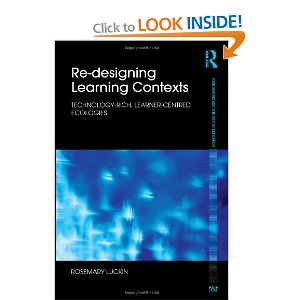Vanessa Pittard DfE, Richard Noss TEL Research Programme Director, BESA, Intellect, ALT, and Demos about research inspired technology enhanced learning to tackle challenges from teenagers’ energy consumption to social communication in a multimodal virtual environment for youngsters with Autism Spectrum Disorders. What the research says event at LKL now has a waiting list for places! Clearly people do want to talk.
What’s Research got to do with it? TEL research and emerging technology, part 2
February 17, 2012 — Prof. Rose Luckin Well I said I would follow-up and continue the discussion about what research can say that can help those developing and using emerging technologies. Coincidentally (or not) I was pointed to a blog post yesterday about the pace of change of technologies and in particular to the comments. I noticed that one of the comments made the very point that:
Well I said I would follow-up and continue the discussion about what research can say that can help those developing and using emerging technologies. Coincidentally (or not) I was pointed to a blog post yesterday about the pace of change of technologies and in particular to the comments. I noticed that one of the comments made the very point that:
“…can we afford to wait for thorough research on some of these issues? If we do wait 3 years for some further research to be done won’t it already be chronically out of date? The technological landscape evolves at a thrilling pace, is it making traditional research models and institutions look a little archaic?”
So clearly there is a need for us researcher folk to better communicate what research has to say that is relevant. I’ll try to pick up on some key things that research can tell us over the next few posts. Sometimes the research that has something to say has been done very recently, sometimes it is specific to a new technology, but actually much of the time there are some basic research findings about how people learn, sometimes from way back that are still very relevant to what technology can do to support learning. These research findings have the advantage of having been tried, tested and developed over many years. Sometime new technologies allow us to benefit from this fundamental research in ways that were not previously possible.
For example, research has demonstrated that learning an additional langauge is assisted by being able to experience the new language and its culture. Technology offers access to authentic linguistic and cultural content, through for example, online newspapers, video, and other digital media in the target language. These may be created for native speakers, but they may also come with enhanced language input, such as access to simplification, explanations, multimedia, subtitles for video.
Effective feedback is important for learning and technology can help – it can offer swift, timely and constructive feedback for students and teachers across all education sectors through interactive tasks that can be automatically marked. It can also support humans to provide feedback to learners using text, sound, images and without needing to be in the same physical place as the learner.
Thinking about and understanding more about what we want people to be able to do in order to learn and then thinking about how particular technologies can help us to achieve this can be just as valuable, if not more valuable, than looking at the specific things that a particular technology can do.

